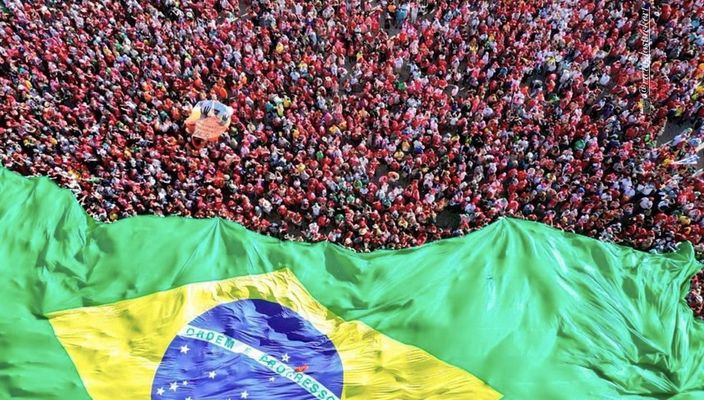REFERÊNCIAS BIBLIOGRÁFICAS
DE SOUZA, H. J. Análise de conjuntura. Petropólis: Vozes, 1984.
INSTITUTO LULA. https://institutolula.org/combate-a-pobreza-uma-comparacao. Instituto Lula.org, 2022. Disponivel em: <https://institutolula.org/combate-a-pobreza-uma-comparacao>. Acesso em: 02 Jan 2023.
OXFAM. Relatório 10 prioridades para vencer a fome no Brasil. São Paulo: OXFAM, 2022.
OXFAM BRASIL. A desigualdade mata. São Paulo: OXFAM, 2022.
ROCHA, J. C. Abordagem Baseada em Direitos Humanos (Human Right Baed Approaches): Fortalecimento Institucional de Empreendedores Negros e Mulheres 0 Lei 13.208 de 2014. In: VARGAS, F. G. Prêmio ESDRAS de Ensino do Direitos - 3ª Edição 2020. São Paulo: Fundação Getúlio Vargas, 2020. p. 01 - 18.
Resumen: El presente estudio tiene como objetivo reflexionar sobre cuáles serán los primeros desafíos del nuevo gobierno juramentado por Luiz Inácio Lula da Silva en 2023. El objetivo es identificar los principales puntos de la agenda del presidente en este primer año de mandato. Este artículo se justifica por la necesidad de producir, preservar y difundir conocimiento sobre este tema, además de llamar la atención de la sociedad civil y del Estado sobre temas que nos parecen fundamentales para nuestro país. La metodología utilizada para llevar a cabo el estudio fue la investigación bibliográfica, documental, observación directa y entrevistas con algunos líderes populares sobre los desafíos para el nuevo gobierno. Además de la introducción, el estudio se subdivide en las siguientes partes: análisis del contexto político, económico, social y cultural considerando tres dimensiones: el momento histórico; los sujetos involucrados y el lugar donde ocurre el fenómeno. La segunda parte rescatará el desafío de reanudar el principio constitucional de responsabilidad estatal con Ciudadanía, Dignidad de la Persona Humana y radicalización del Estado Democrático de Derecho. La tercera parte, por otra, es el desafío de luchar contra el hambre y la pobreza en el país. La cuarta parte presentará los desafíos en el campo de la lucha contra la desigualdad social, la reducción de las asimetrías inter e intrarregionales y la promoción de la diversidad, la pluralidad de los pueblos y la ética de la alteridad. Finalmente, escribiremos una conclusión con algunos puntos que consideramos esenciales para que todo esto suceda. Este trabajo fue escrito en la cabecera del Centro de Referencia en Desarrollo y Humanidades de la Universidad Estatal de Bahía (CRDH/UNEB), como área de actuación en todo el Estado de Bahía y con sede en el Centro Histórico de Salvador à Ladeira do Carmo, 37, Santo Antonio, Pelourinho, Salvador, Bahía. Este artículo forma parte de un proyecto de investigación y difusión del conocimiento titulado "Relatos do Fosso: um olhar do Brasil Profundo" que iniciamos en 2023 para dar voz a las comunidades de todo Brasil.
Palabras-clave: Lula; Gobierno federal; Desafíos; Presidencia de la República; Brasil
Abstract: The present study aims to reflect on what will be the first challenges of the new government sworn in by Luiz Inácio Lula da Silva in 2023. The goal is to identify the main points of the president's agenda in this first year in office. This article is justified by the need to produce, preserve and disseminate knowledge on this subject, in addition to drawing the attention of civil society and the State to issues that seem fundamental to us for our country The methodology used to carry out the study was bibliographic research, documentary, direct observation and interviews with some popular leaders about the challenges for the new government. In addition to the introduction, the study is subdivided into the following parts: analysis of the political, economic, social and cultural context considering three dimensions: the historical moment; the subjects involved and the place where the phenomenon happens. The second part will rescue the challenge of resuming the constitutional principle of state accountability with Citizenship, Dignity of the Human Person and radicalization of the Democratic Rule of Law. The third part, on the other, is the challenge of fighting hunger and poverty in the country. The fourth part will present the challenges in the field of combating social inequality, reduction of inter and intraregional asymmetries and promotion of diversity, plurality of peoples and ethics of otherness. Finally, we will write a conclusion with some points that we consider essential for all this to happen. This work was written in the head of the Center for Reference in Development and Humanities of the State University of Bahia (CRDH/UNEB), as an area of activity throughout the State of Bahia and based in the Historical Center of Salvador à Ladeira do Carmo, 37, Santo Antônio, Pelourinho, Salvador, Bahia. This article is part of a research and dissemination project of knowledge entitled "Relatos do Fosso: Um Olhar do Brasil Profundo" that we started in 2023 to give voice to communities throughout Brazil.
Key words: Lula; Federal government; Challenges; Presidency of the Republic; Brazil




